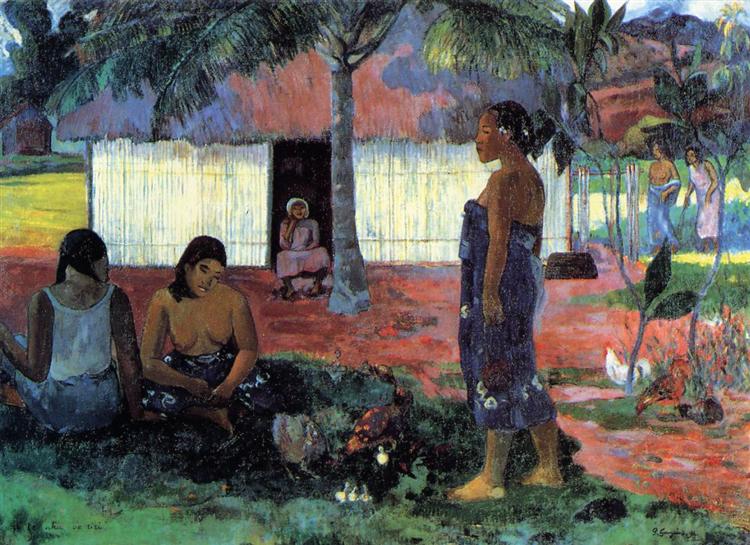Description
Paul Gauguin's Why Are You Angry? - 1896 is a fascinating example of the symbolism and emotional exploration that characterise his mature career. Painted during his stay in Tahiti, this work sums up his search for the exotic and his desire to connect with a non-Western culture, through representations that combine the mythological and the everyday.
The canvas presents three figures in the foreground, highlighting the figure of a woman who, with a serene but enigmatic face, seems to convey a deep emotion - perhaps mourning or melancholy - that contrasts with the vibrant tone of her surroundings. The emotional connection evoked by the characters is powerful, suggesting a story that invites introspection. The question posed in the title can be interpreted as a mirror of the human condition, questioning not only the nature of anger, but also the cultural and emotional context that surrounds it.
The color palette is central to the narrative development of the painting. Gauguin uses saturated hues of greens, yellows, and blues that create an almost dreamlike atmosphere, distancing the work from a realistic representation and seeking a deeper evocation of sensations. This technique of using color, a hallmark of Post-Impressionism, allows the work to feel like a glimpse through the artist’s eyes, with each nuance reflecting an emotion or memory. Intense shadows and fluid lines bring a dynamism that guides the viewer’s eye through the composition, emphasizing the mystery surrounding the figures.
The relationship between the figures is enigmatic and opens up a spectrum of narrative possibilities. The woman’s posture and expression, as well as the presence of a man at her side, seem to suggest a silent conversation filled with meaning. Gauguin may be commenting on the pressures of social and personal life in an environment that, despite its natural beauty, is fraught with emotional and cultural complexities. This focus on human interactions is very much in line with recurring themes in Gauguin’s work, where the exploration of the human soul is intertwined with his interest in indigenous cultures.
The work is part of the tradition of symbolism, a stratified movement that advocates interpretation, the use of symbols and the subjective expression of reality. The influence of this movement is palpable in the coherence of the visual language that Gauguin develops, transforming everyday details into universal dialogues about the human condition. The figure of the woman, in particular, may recall the Muses of earlier works, where the feminine is not only an object of desire, but a channel of emotional introspection.
“Why Are You Angry?” is not simply a question; it is bridging the complexity of feelings with the dimensions of human existence. The work invites the viewer to not only observe, but also to feel and reflect on universal and shared human emotions. By connecting the personal with the cultural and the emotional, Gauguin offers us a window into his inner world, while challenging our own perceptions and responses to anger, love, and connection. In every stroke, the artist manages to fuse his reality with the mystical, thus establishing his place in art history as a bridge between the Western and non-Western worlds.
KUADROS ©, a famous painting on your wall.
Hand-made oil painting reproductions, with the quality of professional artists and the distinctive seal of KUADROS ©.
Painting reproduction service with satisfaction guarantee. If you are not completely satisfied with the replica of your painting, we will refund 100% of your money.

